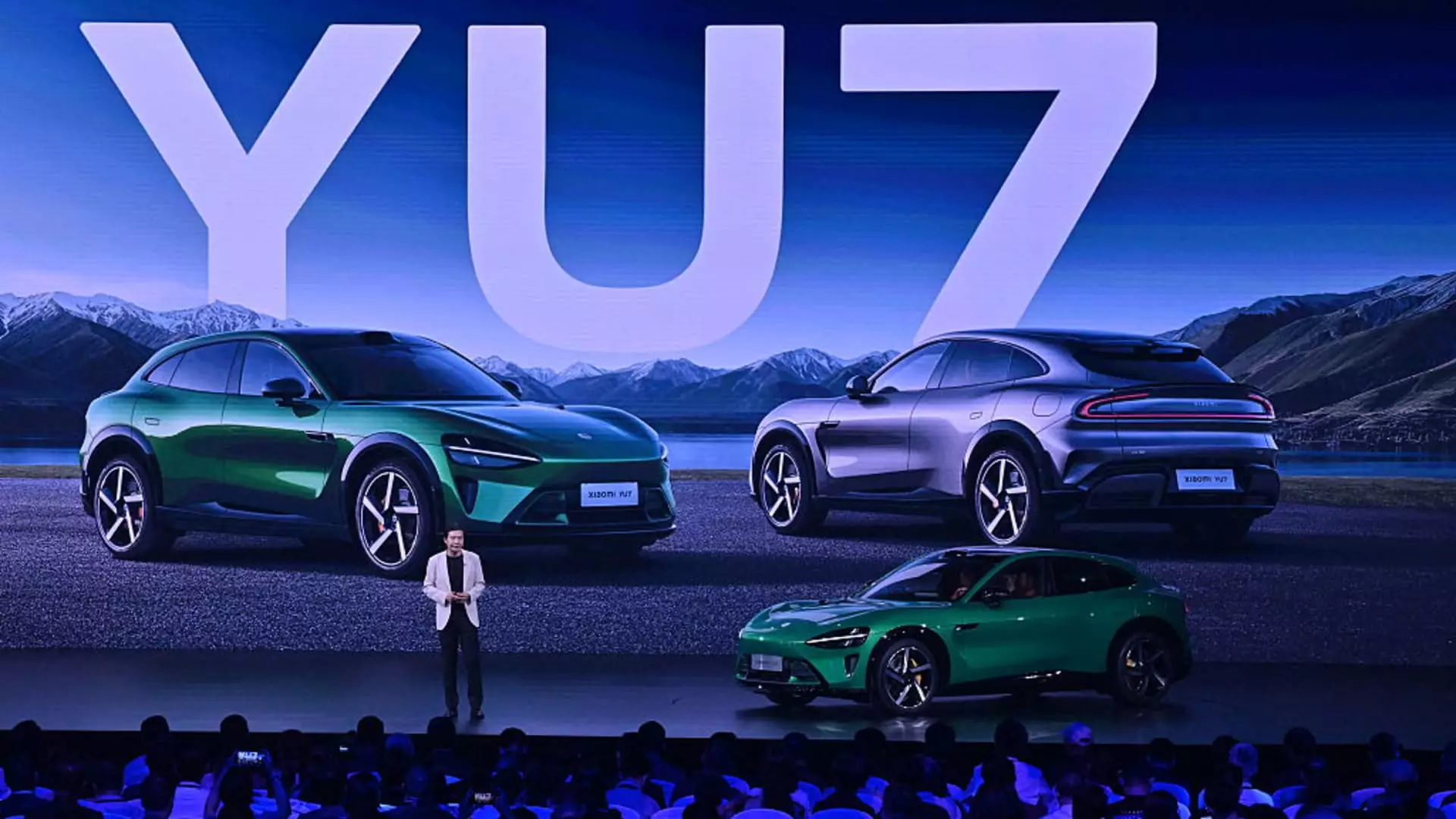In what many industry insiders regard as a daring move, Xiaomi, a tech giant renowned for its budget-friendly smartphones, has recently made its foray into the electric vehicle (EV) realm. Just under a year after unveiling its inaugural electric sedan, the company has set its sights on taking a substantial bite out of Tesla’s dominance in China—specifically targeting the prized Model Y. With the launch of its latest model, the YU7 SUV, Xiaomi is not merely dipping its toes but diving headfirst into a competitive landscape that has already seen traditional automotive moguls scramble to adapt.
Xiaomi’s latest offering boasts an impressive driving range of 760 kilometers (472 miles) on a single charge—making it an enticing alternative for consumer demographics heavily concerned about range anxiety. For context, Tesla’s Model Y with an extended range offers 719 kilometers, a not insignificant difference. This larger-than-life claim plays directly into consumers’ fears about battery life, setting Xiaomi up as a formidable contender against the already established legacy brands in a market that is rapidly evolving.
A Competitive Edge at the Right Price
Xiaomi’s ambitious pricing strategy is equally noteworthy. Analysts at Citi project that the YU7 will retail for between 250,000 and 320,000 yuan ($34,700 to $44,420). This pricing strategy positions the YU7 squarely against Tesla’s Model Y, which starts at 263,500 yuan (about $36,500). According to Citi’s forecasts, Xiaomi could achieve monthly sales of approximately 30,000 units and annual sales potentially soaring between 300,000 and 360,000 units. The implications of such sales figures are not merely numbers on a page—they signal a potential shift in consumer preferences and market dynamics.
However, it is critical to note that entering this arena will require Xiaomi to navigate a myriad of challenges. Tesla’s established reputation for high-performance vehicles, coupled with the challenges of brand trust inherent in new entrants, will put Xiaomi’s mettle to the test. In a market where consumer loyalty can be volatile and easily swayed by reviews and performance metrics, Xiaomi will need more than just a competitive price to dethrone Tesla.
Consumer Concerns and Market Sentiments
Despite an optimistic outlook, the journey to supremacy will not be without its hurdles. The recent recall of Xiaomi’s SU7 sedan due to a fatal crash has cast a shadow on the brand’s image. Such incidents highlight the immense responsibility of automakers, especially those advertising advanced driver-assist features. The aftermath has raised questions about safety protocols and the maturity level of driver-assist technologies among newer entrants.
The stakes are high; consumer trust is not easily reclaimed. Xiaomi must tread carefully, reshaping its marketing narratives to focus on safety, reliability, and user experience. This will be crucial, especially in light of the rapid evolution of driver-assist technologies, which are now a central selling point in many new EVs.
Rivalry and the Road Ahead
With competitors like BYD and Xpeng already making marks in the EV space, Xiaomi isn’t the only company vying for attention. The automotive landscape is increasingly crowded, with each player attempting to carve a niche. For instance, BYD’s Seagull and Geely’s recent entries have highlighted the growing appetite for more budget-friendly electric options among consumers. The competitive tension will likely spur innovations that can either elevate the standards of EVs or lead to price wars, ravaging profit margins.
Interestingly, Xiaomi is not merely positioned as a tech-to-automotive transition; it’s a reflection of a larger trend where tech giants are infringing upon traditional industries. Companies that can adapt and innovate—responding to consumer needs in real time—are better poised for success than those clinging to outdated business models.
Looking ahead, Xiaomi has an uphill battle to fight, and it remains to be seen whether the YU7 can translate initial hype into enduring customer loyalty and sales. The industry is changing, and companies willing to navigate the crossroads of technology and consumer expectations will define the future of not only the electric vehicle market but potentially the entire automotive industry.

